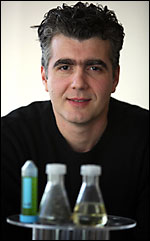 Algae - like a breath mint for smokestacks
Algae - like a breath mint for smokestacks That's the title the Boston-based Christian Science Monitor headlined their story about a bioconversion technology born at MIT by rocket scientist Dr. Isaac Berzin (pictured at right). Here's writer Mark Clayton's description of the base process:
Bolted onto the exhaust stacks of a brick-and-glass 20-megawatt power plant behind MIT's campus are rows of fat, clear tubes, each with green algae soup simmering inside.
Fed a generous helping of CO2-laden emissions, courtesy of the power plant's exhaust stack, the algae grow quickly even in the wan rays of a New England sun. The cleansed exhaust bubbles skyward, but with 40 percent less CO2 (a larger cut than the Kyoto treaty mandates) and another bonus: 86 percent less nitrous oxide.
After the CO2 is soaked up like a sponge, the algae is harvested daily. From that harvest, a combustible vegetable oil is squeezed out: biodiesel for automobiles. Berzin hands a visitor two vials - one with algal biodiesel, a clear, slightly yellowish liquid, the other with the dried green flakes that remained. Even that dried remnant can be further reprocessed to create ethanol, also used for transportation.
Dr. Berzin is the founder of Greenfuels Technologies Corporation which is marketing their process in a joint initiative with NRG Energy, Inc. - see excerpts from their press release below.
----------
NRG Energy, Inc. Announces Partnership to Pursue Innovative Technology for Recycling Carbon Dioxide Emissions into Biofuel
May 16, 2006--NRG Energy, Inc. (NYSE:NRG) has formed a joint initiative with GreenFuel Technologies Corporation (GreenFuel) and the New York State Energy Research and Development Authority (NYSERDA) to study carbon dioxide (CO2) recycling. The technology takes the flue gas of a power plant and utilizes GreenFuel's innovative, algae-bioreactor technology to effectively recycle CO2 into commercially viable byproducts. NRG's Dunkirk facility, a coal-fueled power plant located in western New York State, will serve as the host site for the study.
NRG's participation in this study is part of "ecoNRG," the Company's ongoing and extensive environmental business effort. In field tests to be conducted at Dunkirk, GreenFuel will utilize a mini-bioreactor system to assess the technical and economic feasibility of its Emissions-to-Biofuel(TM) process that harnesses the photosynthetic processes of algae to consume waste gases and heat from a power plant's air emissions stream, ultimately producing a high energy biomass. This means that in the presence of light, the single-celled algae take up CO2 to produce the energy that fuels plant life--with a general rule of thumb being that two tons of algae remove one ton of CO2. Once the algae are harvested, they can be converted to generate commercially viable byproducts such as ethanol or biodiesel.
technorati bioenergy, algae, smoke, biofuels, ethanol,, Greenfuel


No comments:
Post a Comment